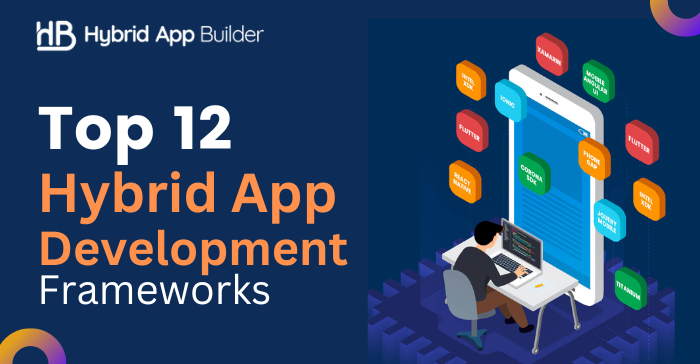
Are you looking to build a mobile app that works seamlessly across different platforms? Do you want to develop an app with a native look and feel but also leverage the benefits of web technologies? Hybrid app development is the answer for cross-platform mobile app development, but choosing the right one can be overwhelming with a plethora of frameworks available.
Fortunately, our blog provides a curated list of the top 12 hybrid mobile app development frameworks that offer essential tools and libraries for building fast, responsive, and scalable apps.
Read Now!
Hybrid App Development: Brief Intro
In the fast-paced modern world, businesses are always searching for ways to deliver the optimal user experience to their customers. It involves developing mobile apps that work seamlessly across multiple platforms.
It is a popular approach that combines the best of both worlds by using a single codebase to create apps that work across iOS and Android devices.
“Transform your mobile app from average to exceptional with the right hybrid application development framework choice”
Top 12 Frameworks For Hybrid App Development
React Native
Developed by Facebook, React Native was launched in 2015. It uses the JavaScript programming language to create apps for iOS and Android. With its single codebase, it uses native components, resulting in a more native look and feel. In addition, it allows developers to access native device features and see real-time changes in the app’s UI through hot reloading.
Xamarin
Not mentioning Xamarin in the list of the best frameworks for Hybrid app development will be a gross injustice to this framework developed by Microsoft. It uses C# and enables cross-platform app development. It also allows access to native device features and easy integration with Visual Studio.
Flutter
Flutter is a mobile app development framework that facilitates cross-platform app development using the Dart programming language. It is one of the best frameworks for mobile app development, and comes with a hot reload feature that lets developers see changes in the app’s UI in real-time.
Framework7
If you’re looking for a rich ecosystem of components for Vue, React, and Svelte, Framework7 is the name. Its helpful features, such as page transition animation, native scrolling, multiple views support, and library-agnostic, are best. It allows hardware-accelerated animations through CSS3 and route pages through a combination of XHR.
Onsen UI
Released in 2013, this Onsen UI- the most popular hybrid app framework for app development gives the flexibility to choose and switch between popular Javascript frameworks- AngularJs, ReactJs, and Vue Js. It allows for cross-platform app development and provides a variety of pre-built UI components to help with app development.
jQuery Mobile
jQuery Mobile is a lightweight framework that uses HTML, CSS, and JavaScript to build mobile apps that work on various platforms, including iOS, Android, and Windows. It also offers a theming system, making customizing the app’s visual design easy.
NativeScript
NativeScript – a framework for hybrid app development preferred by top professionals. NativeScript-built apps provide a fully native experience and utilize the same APIs, creating the illusion that they were developed using Xcode for the App Store and Android Studio for the Play Store. With no requirement for WebViews, you can obtain platform-native UI.
Ionic
Ionic is a popular framework for hybrid app development that uses HTML, CSS, and JavaScript. Built on a popular JavaScript framework- Angular, it provides a variety of pre-built components to help with app development. It also allows for cross-platform app development and provides access to native device features like camera and geolocation.
Kendo UI
Owned by Progress Telerik, world-class support and guarantees on testing every component is the main USP of Kendo UI. The same organization-Progress, Telerik, powers NativeQuery- the best framework for hybrid mobile app development that is already discussed above.
We’re at the end of the top 10 hybrid mobile app frameworks.
Aurelia
Aurelia is a modern open-source JavaScript framework enabling developers to build dynamic, robust, scalable web applications. It follows a modular architecture, allowing developers to use only the necessary libraries and features they need, resulting in lean and performant applications.
Adobe PhoneGap Build
Adobe PhoneGap Build is a cloud-based service that allows developers to build hybrid mobile apps using web technologies such as HTML, CSS, and JavaScript. It supports iOS, Android, and Windows platforms.
Sencha Touch
Sencha Touch is a JavaScript-based framework that allows developers to build hybrid mobile apps with a native look and feel. It supports iOS, Android, and Blackberry platforms. It has a powerful set of built-in UI components and provides a robust MVC architecture, making it a popular choice for building complex enterprise-level hybrid mobile applications.
Which One Is Best For You?
Choosing the right hybrid app framework is crucial for seamless, high-quality multi-platform mobile app development. From React Native’s flexibility to Xamarin’s native performance, from Ionic’s pre-built UI components to Flutter’s hot-reloading, the choices are plenty.
These frameworks empower developers to build fast, responsive, and scalable hybrid mobile apps, reducing time and effort for cross-platform app development. Explore these frameworks to find the best fit for building a mobile app that caters to diverse users.
HybridAppBuilders
Latest posts by HybridAppBuilders (see all)
- The Best Flutter App Development Trends in 2025 - April 10, 2025
- A Comparative Study of Cross-platform Mobile Application Development - April 4, 2025
- Flutter 4.0: The Next Chapter in Cross-Platform Development - March 27, 2025
